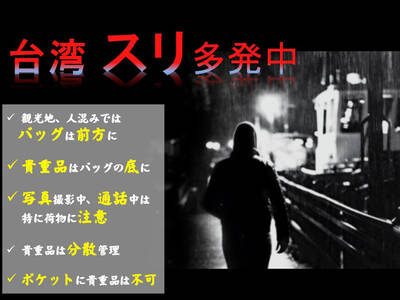A Chinese man who claims to have spent time in jail for setting fire to Japanese property in Japan and South Korea has threatened to burn down a Japanese shrine in Pingtung County.
The man, who identified himself as Liu Qiang (劉強), said in a video on Twitter that he plans to “rid Taiwan of the obstruction caused by separatists and allow the ‘mother country’ to be united.”
Liu described plans to visit Pingtung County “some time in September” to destroy the Gaoshi Shrine (高士神社), which was built “on Chinese land by Japanese invaders.”

Photo: Tsai Tsung-hsien, Taipei Times
“My goal in destroying the shrine is to declare that Taiwan belongs to China,” he said, adding that he was not afraid of prison or “being extradited to Japan by the Taiwanese separatists.”
Police on the Hengchun Peninsula (恆春半島), where the shrine is located, said that they are on heightened alert and have increased patrols at the temple.
One resident said the locals hoped that the shrine, which is a historical site and scenic attraction, would not be politicized in the run-up to national elections in January.
“The shrine was not built for political reasons. The constant politicizing of the shrine is gravely misleading and erroneous,” they said.
Japanese Shinto priest Kenichi Sato, who rebuilt the shrine in 2015 and donated it to the county to thank Taiwanese for their support and assistance during the earthquake and tsunami that struck northern Japan in 2011, said that the shrine was originally built for religious reasons.
Built during the Japanese colonial period in 1939, the shrine had been damaged by typhoons over the years and left in a state of disrepair, he said.
Sato became involved in the shrine’s repair after young Paiwan locals asked Shinto officials in Japan to assist with its restoration.
Shrine manager Chen Chung-yuan (陳重源) said that the shrine still has religious meaning for some people and is a part of the county’s cultural history, as well as a scenic spot.
If the shrine were to be burned down it would bring immeasurable harm to the local Paiwan community and damage the community’s relationship with non-Paiwan people, he said.
Chen said that he contacted the police and immigration authorities when he learned of the threat.
Liu’s post was shared by more than 60,000 Japanese users on Twitter, with many urging Taiwanese to remain alert.
Last year, a 68-year-old Taiwanese man surnamed Chung (鍾) also threatened to burn the shrine to commemorate the 1937 Marco Polo Bridge Incident.
Former Chinese Nationalist Party (KMT) lawmaker Alex Tsai (蔡正元) had previously posted an article criticizing the Democratic Progressive Party for allowing it to be restored and called the shrine an insult to Aborigines.

GENSLER SURVEY: ‘Economic infrastructure is not enough. A city needs to inspire pride, offer moments of joy and foster a sense of belonging,’ the company said Taipei was named the city with the “highest staying power” in the world by US-based design and architecture firm Gensler. The Taiwanese capital earned the top spot among 65 cities across six continents with 64 percent of Taipei respondents in a survey of 33,000 people saying they wanted to stay in the city. Rounding out the top five were Vietnam’s Ho Chi Minh City (61 percent), Singapore (59 percent), Sydney (58 percent) and Berlin (51 percent). Sixth to 10th place went to Monterrey, Mexico; Munich, Germany; Sao Paulo, Brazil; Vancouver; and Seoul. Cities in the US were ranked separately, with Minneapolis first at

The Japan-Taiwan Exchange Association has cautioned Japanese travelers to be vigilant against pickpockets at several popular tourist spots in Taiwan, including Taipei’s night markets, the Yongkang Street area, Zhongshan MRT Station, and Jiufen (九份) in New Taipei City. The advisory, titled “Recent Development of Concerns,” was posted on the association’s Web site under its safety and emergency report section. It urges travelers to keep backpacks fully zipped and carried in front, with valuables placed at the bottom of the bag. Visitors are advised to be especially mindful of their belongings when taking photos or speaking on the phone, avoid storing wallets and

Scoot announced yesterday that starting in October, it would increase flights between Taipei and Japan’s Narita airport and Hokkaido, and between Singapore and Taipei. The low-cost airline, a subsidiary of Singapore Airlines, also said it would launch flights to Chiang Rai in Thailand, Okinawa and Tokyo’s Haneda airport between December and March next year. Flights between Singapore and Chiang Rai would begin on Jan. 1, with five flights per week operated by an Embraer E190-E2 aircraft, Scoot said. Flights between Singapore and Okinawa would begin on Dec. 15, with three flights per week operated by Airbus A320 aircraft, the airline said. Services between Singapore

ENDORSING TAIWAN: Honduran presidential candidate Nasry Afura said that Honduras was ‘100 times better off’ when it was allied with Taipei The Ministry of Foreign Affairs yesterday said it would explore the possibility of restoring diplomatic relations with Honduras based on the principle of maintaining national interests and dignity. The ministry made the remarks in response to reporters’ questions regarding an article titled: “Will Taiwan Regain a Diplomatic Ally?” published in The Diplomat on Saturday. The article said Honduras’ presidential election in November could offer Taiwan the chance to regain an ally, as multiple candidates have promoted re-establishing diplomatic relations with Taiwan. Honduras severed diplomatic ties with Taiwan in March 2023 in favor of Beijing, but since switching its diplomatic recognition,